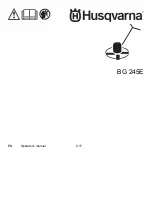
• Make sure that you know how to stop the product
quickly in an emergency.
• The operator must have the physical strength that is
necessary to operate the product safely.
• Use personal protective equipment. Refer to
Personal protective equipment on page 6
.
• Make sure that only approved persons are in the
work area.
• Keep the work area clean and bright.
• Make sure that you are in a safe and stable position
during operation.
• Make sure that there is no risk that you or the
product can fall from a height.
• Make sure that there is no grease or oil on the
handle.
• Do not use the product in areas where fire or
explosions can occur.
• The product can cause objects to eject at high
speed. Make sure that all persons in the work area
use approved personal protective equipment.
Remove loose objects from the work area.
• Before you go away from the product, stop the
product and disconnect the power source.
• Make sure that the power outlet voltage agrees with
the voltage that is given on the rating plate of the
product.
• Make sure that clothes, long hair and jewelry do not
get caught in moving parts.
• Do not sit on the product.
• Do not hit the product.
• Make sure that you or other persons cannot get
caught in and fall on cables, hoses and shafts in the
work area.
• Before you operate the product, find out if there are
hidden wires, electrical cables or other sources of
electricity. Do not operate the product unless you
know that it is in a safe work area.
Vibration safety
WARNING: Read the warning instructions
that follow before you use the product.
• During operation of the product, vibrations go from
the product to the operator. Regular and frequent
operation of the product can cause or increase the
degree of injuries to the operator. Injuries can occur
in fingers, hands, wrists, arms, shoulders, and/or
nerves and blood supply or other body parts. The
injuries can be debilitating and/or permanent, and
can increase gradually during weeks, months or
years. Possible injuries include damage to the blood
circulation system, the nervous system, joints, and
other body structures.
• Symptoms can occur during operation of the product
or at other times. If you have symptoms and
continue to operate the product, the symptoms can
increase or become permanent. If these or other
symptoms occur, get medical aid:
• Numbness, loss of feeling, tingling, pricking,
pain, burning, throbbing, stiffness, clumsiness,
loss of strength, changes in skin color or
condition.
• Symptoms can increase in cold temperatures. Use
warm clothing and keep your hands warm and dry
when you operate the product in cold environments.
• Do maintenance on and operate the product as
given in the operator's manual, to keep a correct
vibration level.
• The product has a vibration damping system that
decreases the vibrations from the handles to the
operator. Let the product do the work. Do not push
the product with force. Hold the product at the
handles lightly, but make sure that you control the
product and operate it safely. Do not push the
handles into the end stops more than necessary.
• Keep your hands on the handle or handles only.
Keep all other body parts away from the product.
• Stop the product immediately if strong vibrations
suddenly occurs. Do not continue the operation
before the cause of the increased vibrations is
removed.
Dust safety
WARNING: Read the warning instructions
that follow before you use the product.
• Operation of the product can cause dust in the air.
Dust can cause serious injury and permanent health
problems. Silica dust is regulated as harmful by
several authorities. These are examples of such
health problems:
• The fatal lung diseases chronic bronchitis,
silicosis and pulmonary fibrosis
• Cancer
• Birth defects
• Skin inflammation
• Use correct equipment to decrease the quantity of
dust and fumes in the air and to decrease dust on
work equipment, surfaces, clothing and body parts.
Examples of controls are dust collection systems
and water sprays to bind dust. Decrease dust at the
source where possible. Make sure that the
equipment is correctly installed and used and that
regular maintenance is done.
• Use approved respiratory protection. Make sure that
the respiratory protection is applicable for the
dangerous materials in the work area.
• Make sure that the airflow is sufficient in the work
area.
• If it is possible, point the exhaust of the product
where it cannot cause dust to go into the air.
1132 - 001 - 06.04.2020
5
























